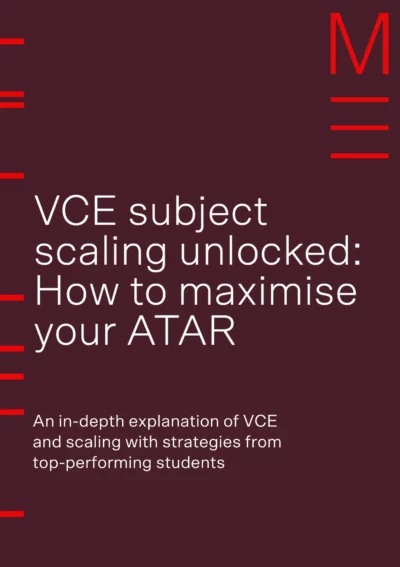Welcome to Matrix Education
To ensure we are showing you the most relevant content, please select your location below.
Select a year to see courses
Learn online or on-campus during the term or school holidays
Learn online or on-campus during the term or school holidays
Learn online or on-campus during the term or school holidays
Learn online or on-campus during the term or school holidays
Learn online or on-campus during the term or school holidays
Learn online or on-campus during the term or school holidays
Learn online or on-campus during the term or school holidays
Get HSC exam ready in just a week
Select a year to see available courses
Science guides to help you get ahead
Science guides to help you get ahead

The second step in figuring out your ATAR is converting your raw study score into a scaled score.
An in-depth explanation of VCE and scaling with strategies from top-performing students. Fill out your details below to get this resource emailed to you. "*" indicates required fields
Free 2025 VCE ATAR & Scaling Guide Download

Free 2025 VCE ATAR & Scaling Guide Download
Scaling is the process of adjusting raw study scores so that students aren’t disadvantaged or advantaged based on the studies they choose.
It’s harder to get a high VCE study score in some subjects than others. This is purely because some subjects attract a more competitive group of students, not because the subject is harder than others. Scaling helps adjust for these differences.
For example, if it’s more difficult to get a 30 in Maths Methods than getting the same score in Further Maths, the Maths Methods score would be adjusted (scaled up) to reflect this.
Even though your scaled score may be different from your raw score, your ranking in the course would stay the same.
Think of scaling like converting foreign currency (the raw score of a study) into the Australian dollar (the scaled score of a study). Different VCE studies have different “exchange rates” when they’re converted into scaled scores.
All VCE study scores are scaled by VTAC (The Victorian Tertiary Admissions Centre).
Scaling is important because it makes sure that all studies are treated the same. Students take different combinations of VCE subjects, and it’s hard to compare scores from different subjects.
Without scaling, students who choose “harder” studies might be at a disadvantage, while those in “easier” studies could get an unfair advantage. By adjusting scores, scaling helps ensure that students’ performance can be compared fairly.
How would you compare Oliver’s score of 45 in Specialist Mathematics with his friend who scored 47 in Foundation Mathematics? Who performed better? Scaling helps compare them fairly and turn their scores into an ATAR.
So, scaling helps make sure your study scores are fair, no matter which subjects you choose to take.
Here are some tips on how certain VCE subjects typically scale each year and what to consider when selecting your subjects. We’ve reviewed scaling reports from VTAC for 2021-22, 2022-23, and 2023-24 to provide accurate insights and help guide your choices.
Further Mathematics typically scales down by 2-3 points. In 2021, almost all study scores were brought down, even a score as high as 45 was scaled down by 1.
If you’re a capable Mathematics student and you’re deciding between Maths Methods and Specialist Maths, you should aim for Specialist Maths.
If you’re good at Science, think about taking Chemistry or Physics over Psychology.
A lot of students think that to get the best ATAR, they should pick studies that were scaled up in previous years. This isn’t true and can actually hurt your chances! VCE studies are scales based on how well students do each year. You can’t predict how a subject will be scaled each year.
Choosing a subject just because it might get scaled up is a mistake if you’re not good at it or don’t enjoy it. A ‘scaled down’ score in a subject you did well in is usually better than a ‘scaled up’ score in a subject you struggled with. So, don’t let scaling decide your subjects – choose ones you enjoy to make your VCE experience better.
When choosing your studies for Years 11 and 12, you should not choose based on scaling. You can, however, use scaling to understand what marks you’ll need for your desired scaled score.
Ask yourself these questions when selecting studies for Years 11 and 12:
Now that you have your study score, it’s time to see how your ATAR is calculated.
© Matrix Education and www.matrix.edu.au, 2023. Unauthorised use and/or duplication of this material without express and written permission from this site’s author and/or owner is strictly prohibited. Excerpts and links may be used, provided that full and clear credit is given to Matrix Education and www.matrix.edu.au with appropriate and specific direction to the original content.